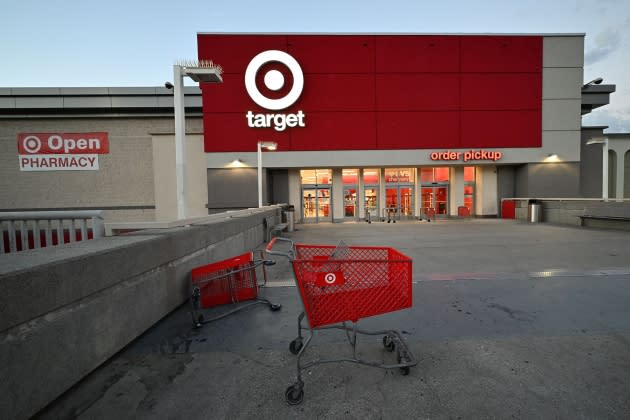A Target Sex-Trafficking Hoax Is Once Again Going Viral On TikTok
- Oops!Something went wrong.Please try again later.

On August 28, TikToker @vincemanuele posted a video with the text “Girl at the front of Target in Phoenix keeps saying ‘Marco’ every time a little girl or boy passes her.” In the video, you can faintly hear someone in the background saying what appears to sound like “Marco.” “Human trafficking is real,” the caption reads, adding that the user’s father “reported” the girl to someone.
More from Rolling Stone
Pro-MAGA D.C. Cop Secretly Worked to Undermine Seth Rich Investigation
Pole Dancers Are the Latest Target of Far-Right Grooming Panic
The video racked up more than 11 million views, with many of the comments focusing on how terrifying it was, even though the little girl in question can’t be seen in the video (and it isn’t even totally clear whether the voice is saying “Marco” in the first place.) Many chimed in claiming they’d seen someone doing something similar at a local Starbucks, or that they’d heard of this happening at a Target in their hometown. The subtext was clear: that pedophiles are using children as bait to abduct other children at Target.
@vincemanuele HUMAN TRAFFICKING is real. My dad ended up reporting it to someone #humantraffickingawareness #humantrafficing #phoenix #arizona #fy #viral #traffickingawarenes #childtraffickingawarenes
♬ Super Freaky Girl – Nicki Minaj
The Marco Polo video is a example of a trend that’s unfortunately all too common on TikTok: people posting videos warning about elaborate trafficking schemes at big-box stores, whether it stems from a sense of moral urgency or a desire for clout. For whatever reason, Target in particular is frequently cited as a trafficker locus: in the past, videos have gone viral on TikTok claiming that criminals are lurking in the produce aisles to abduct young women, or that men are tying zip ties to women’s cars in parking lots to mark them as victims. Yet actual trafficking experts say such claims hold no weight, even though they may garner millions and millions of views. “I have never heard a case of anyone being abducted from Target in my 20 years in this field,” Jean Bruggeman, executive director of Freedom Network USA, a national network of anti-trafficking advocates, previously told Rolling Stone.
With regards to this specific Marco Polo video, some commenters attempted to debunk it, claiming they had encountered the greeter employed at this specific location and that she was not a little girl, but a friendly older woman; some also claimed she wasn’t saying “Marco” at all, but “morning,” or “welcome.” Yet the damage appears to have largely been done, with some other commenters claiming they had called the store to issue a report based on the video. Other creators have also made videos joking about not wanting to assist kids who may be separated from their parents in their stores, out of a fear of being trafficked themselves.
Of course, trafficking is a real issue — it just doesn’t tend to occur in big-box department stores, with shadowy figures lurking in the aisles using creepy children as bait. More often than not, traffickers are people who are trusted friends, partners, or loved ones of victims, who tend to be from marginalized backgrounds, such as LGBTQ teenagers who have left home after being rejected by their families. Videos like the Marco Polo Target trafficking clip have a dual effect: they obscure the actual methodologies of traffickers, stoking fear and spreading misinformation in the process.
This week on Don’t Let This Flop, cohosts Brittany Spanos and Ej Dickson discuss the Marco Polo Target trafficking hoax as part of their weekly Moral Panic segment, as well as dissect the Don’t Worry, Darling Venice Film Festival fiasco, the rise of the TikTok bimbo, and debate whether Leo DiCaprio’s tendency to date women under 25 has anything to do with his climate change advocacy.
Don’t Let This Flop is released Wednesdays on all audio streaming platforms, including Apple Podcasts, Spotify, Amazon Music, Stitcher and more.
Best of Rolling Stone
